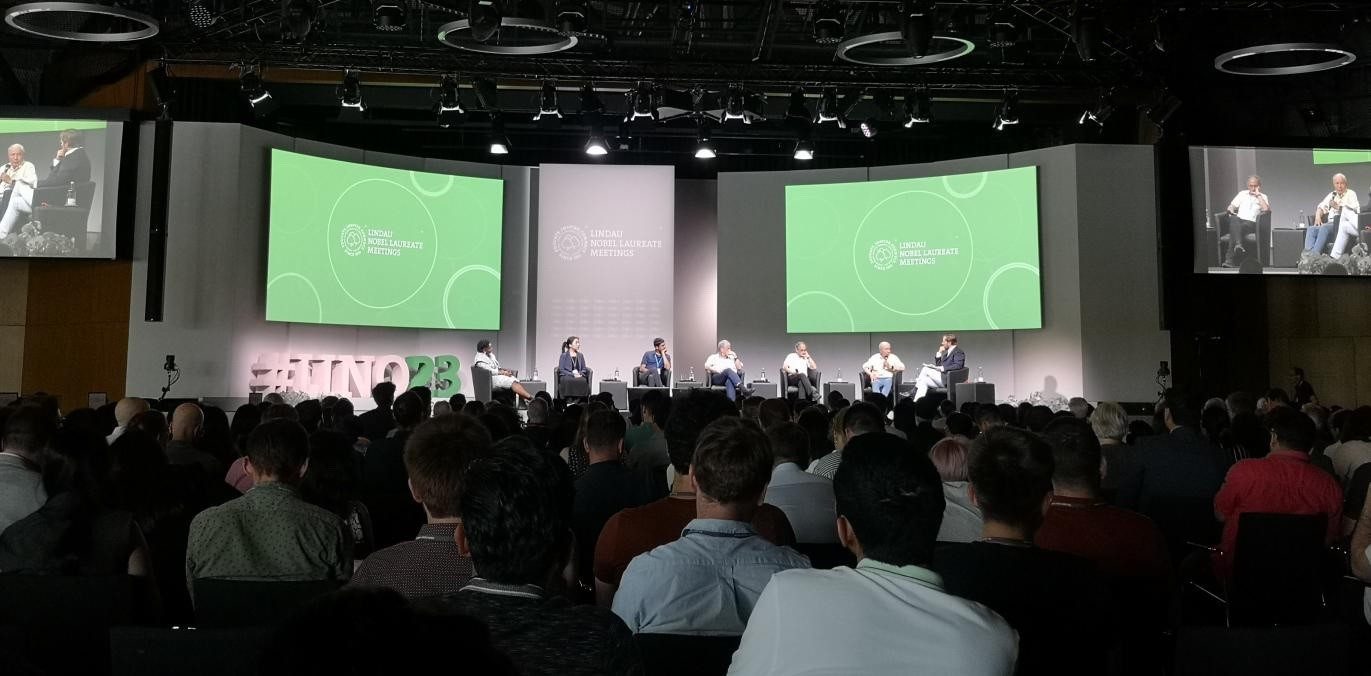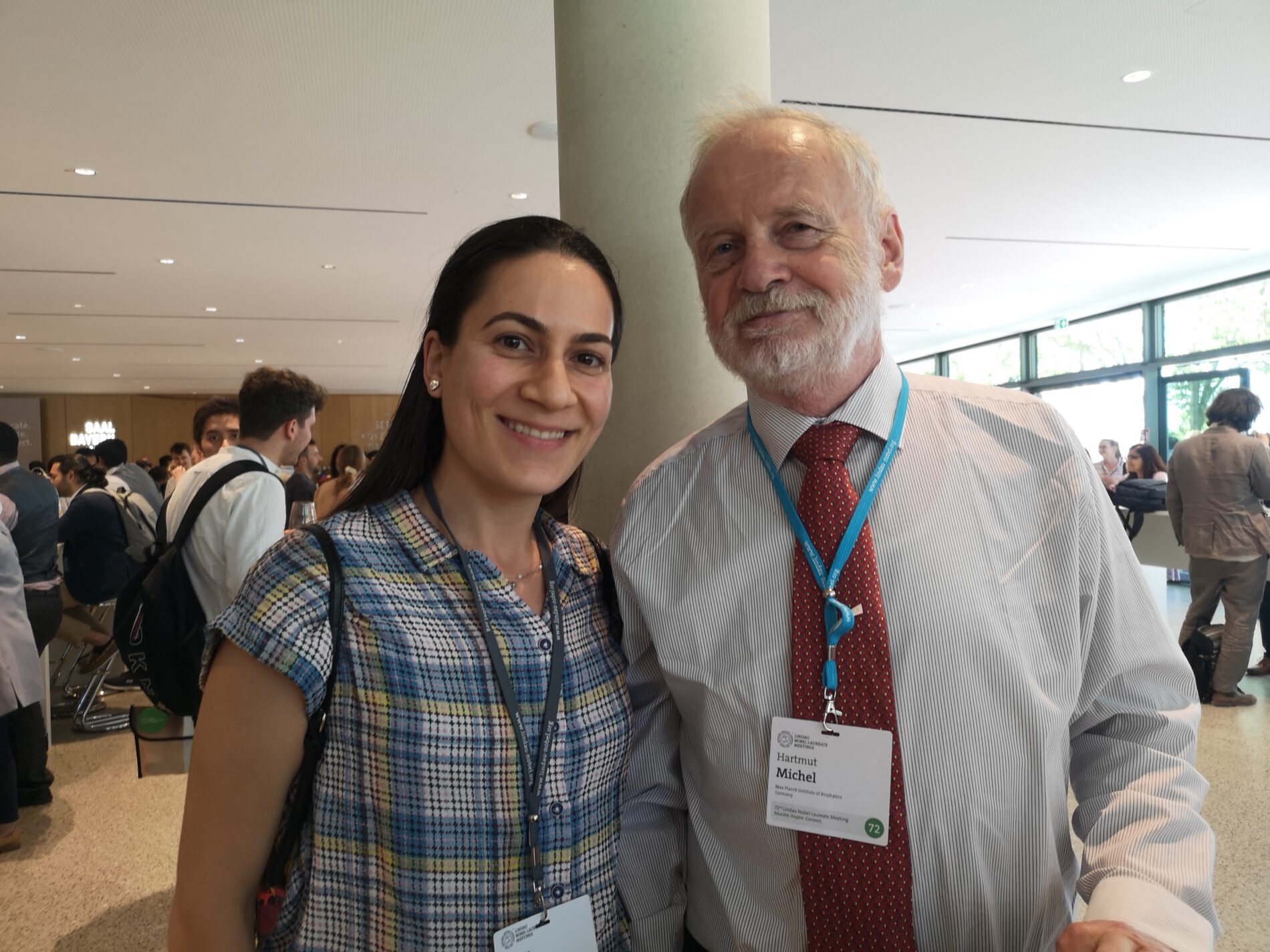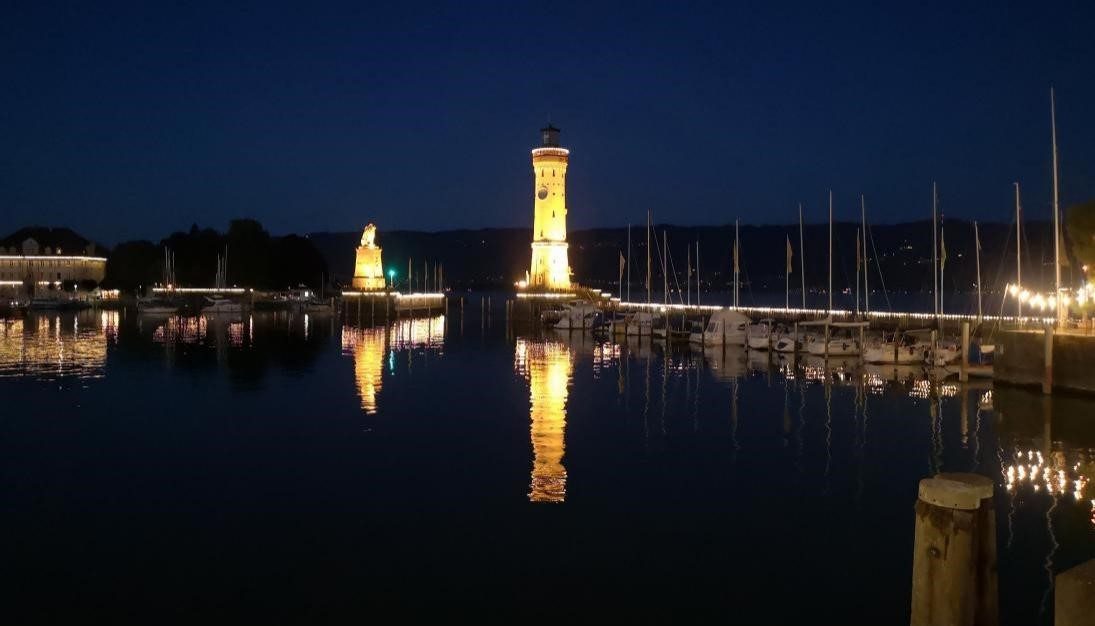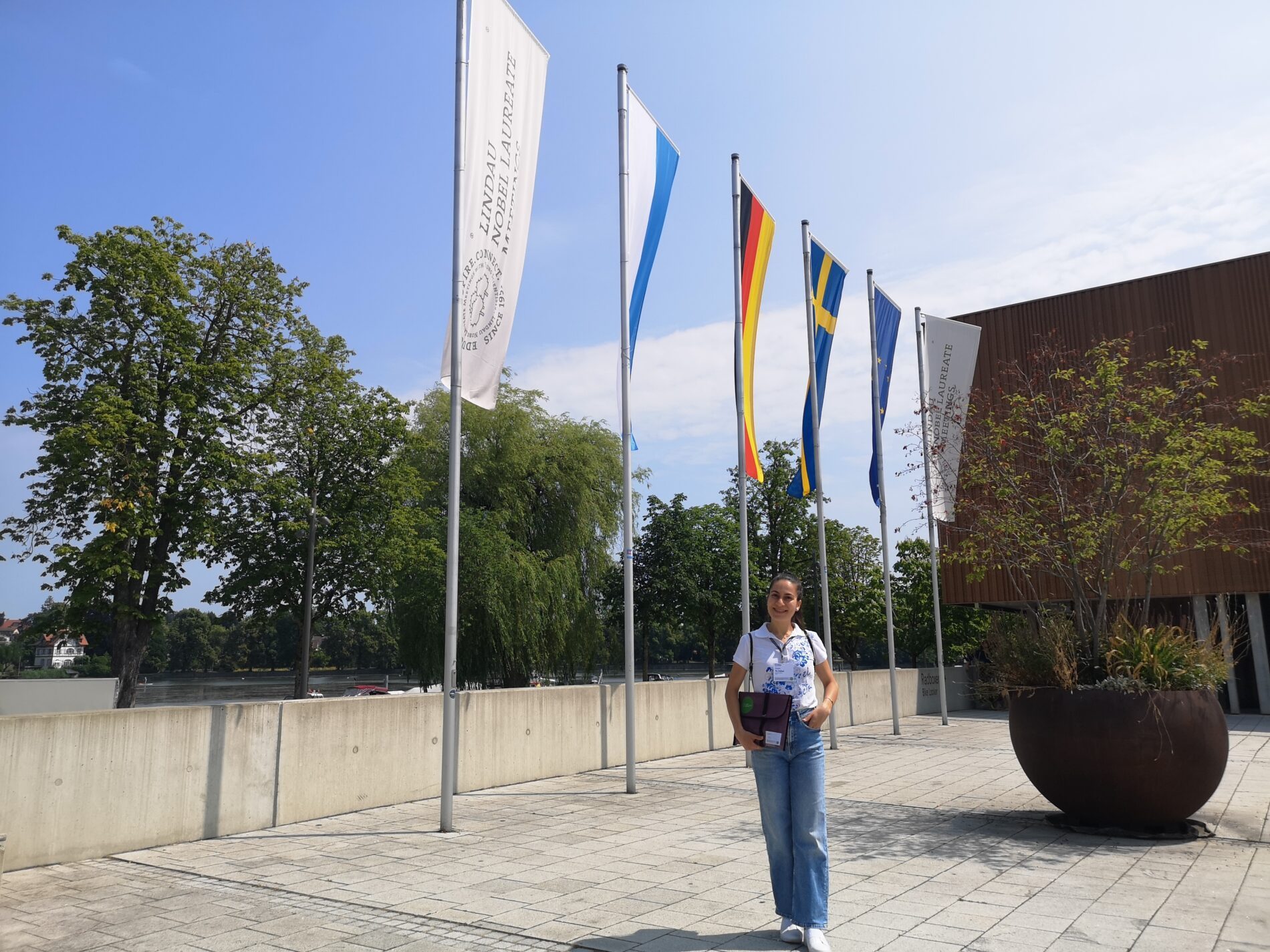by Dr Chryso Pallari, Post-Doctoral Research Fellow
Imagine being able to meet all your idols in a single place…! For most people this place might be Hollywood, but for a scientist, the Lindau Nobel Laureate Meeting is the place to be. The main idea behind it is to bring together young scientists from all over the world and Nobel Laureates with a single purpose, to inspire and drive the next generation of scientists. Each year the meeting focuses on a different topic. This year the meeting took place between 25 and 30 June 2023 at Lake Constance in Lindau, Germany and was all about physiology and medicine with 38 Nobel Laureates and 600 young scientists attending.

Photo 1:
Lindau, Germany, where the 72nd Lindau Nobel Meeting took place.
This meeting lasted for a whole week with each day filled with a mixture of lectures, agora talks, open exchanges, discussions and, of course, social events. It all began with a spectacular opening ceremony where the organizers explained the importance of the meeting to the young scientists and emphasized how the “Lindau spirit” makes the meeting a success. The opening ceremony concluded with a musical contribution by the Ensemble of the Vienna Philharmonic Orchestra, followed by a reception where, for the first time, young scientists and Nobel Laureates had the opportunity to interact with each other.

Photo 2:
Lindau Nobel Laureate Meeting Venue Inselhalle during one of the discussion sessions.
The second day started with a series of lectures, where hot topics in physiology and medicine, such as how the cellular inner workings of the brain manifest in our experience of the world, were discussed. Later on, I had the opportunity to interact even closer with the Nobel Laureates and ask questions during the Open Exchange Sessions. This year, the Republic of Indonesia hosted the International Get-Together event, where dishes from the local cuisine of Indonesia were offered for dinner. Afterward, we enjoyed an awesome night filled with live music and plenty of dancing.

Photo 3:
With Nobel Laureate, Prof. Hartmut Michel.
On the third day, there were many exciting talks and opportunities to chat informally with the Nobel Laureates. It all began with a partner breakfast hosted by Rolex SA on the topic of “Excellence in Science for Society: Harnessing Innovative Science, Medicine, Engineering and Ingenuity to Improve People’s Lives”. The breakfast offered a unique opportunity to explore how excellence in science, combined with serendipity, can lead to groundbreaking innovations like Grégoire Courtine’s neuroprosthetic bridge, which aims to restore mobility to paralyzed individuals through the convergence of medicine, engineering, and creative ingenuity. In the afternoon, there was a special panel discussion on “Artificial Intelligence and Medicine.” I also had the privilege to dine at a Michelin-starred restaurant in the company of Nobel Laureate, Peter Agre, who received the Nobel Prize in Chemistry in 2003 for the discovery of the water channels. The day ended with a relaxed Grill & Chill event next to the Lake Bodensee.

Photo 4:
(Left) During Rolex event. (Right) Having lunch with Nobel Laureate, Prof. Peter Agre.
On the fourth day, young scientists had the chance to present their own research during the Next Gen Science sessions. This was followed by a series of lectures and in the evening, Shwetak N. Patel, recipient of the ACM Prize in Computing, concluded the scientific programme with a lecture on the Emergence of Mobile Phones and Wearables for Health. I wrapped up my day with a partner dinner and science event hosted by Mars, Incorporated, titled “Adding life to our years: the hippocampus, memory, and healthy aging”.

Photo 5:
(Left) With Prof. Shwetak N. Patel. (Right) During the dinner event hosted by Mars, with fellow young scientists.
The fifth day began with an agora talk on Science and Education, followed by a lecture on stem cells and their impact on understanding the development of cancer. Afterwards, William G. Kaelin delivered a lecture on how oxygen sensing can be used for early cancer detection. I was particularly impressed by Charles Rice, who gave a talk on Hepatitis C and the efforts to develop a cure. During the subsequent open exchange, I had the unique opportunity to interact with him and discuss about West Nile virus. In the afternoon, I participated in an interactive workshop on the Lindau Guidelines, which explored ways to foster a responsible and open culture, abiding by ethical standards while addressing the global challenges in humanity. The evening’s social programme was the Bavarian Evening, during which I got to savor authentic Bavarian cuisine, enjoy folk music, and engage with fellow young scientists.

Photo 6:
(Left) With Nobel Laureate, Prof. Charles Rice during the Bavarian Evening. (Right) Outside the main venue.
Following a thrilling week filled with one-on-one interactions, scientific discussions, and inspirational presentations, the 72nd Lindau Nobel Laureate Meeting has come to an end with a boat trip from Lindau to Mainau Island hosted by the State of Baden-Württemberg. Mainau Island is a beautiful place, teeming of flowers and butterflies. On the island, I attended the concluding panel discussion on “Climate Change and Implications on Health”. Following a relaxing afternoon science picnic, we headed back to Lindau. During the returning boat trip, to lighten up the spirit after a busy week, an alumni party with a Dj was held, where everyone danced and had fun. I even had the chance to dance with a Nobel Laureate. Upon arrival at Lindau harbour, we bid our final farewells and I hopped on a bus for my next exciting week, as I had been selected to attend the Baden-Württemberg Post Conference Programme 2023.

Photo 7:
Inside the boat during the returning boat trip.
Baden-Württemberg, situated in the southwestern region of Germany, is the third largest state in Germany and serves as a focal point for science, research, education, innovation, and technology exchange at the core of Europe. In this dynamic environment, students, researchers, scientists, and professors from across the globe join forces to confront the pressing challenges of our time. Along with other 16 selected young scientists from around the world, I seized the opportunity to explore Baden-Württemberg after attending the Nobel Laureate Meeting in Lindau.
During the Post Conference Programme, we had the opportunity to directly engage with potential future employers, immerse ourselves in the local culture and environment, and embark on an in-depth exploration of the opportunities offered by the German Southwest in the field of physiology and medicine. We visited the state universities of Konstanz, Tübingen and Freiburg, and gained insights into the synergistic relationship between industry, science, and applied research in Baden-Württemberg. This was particularly evident during our visits to pioneering centres of innovation, including Cyber Valley, the largest research consortium for artificial intelligence in Europe, the NMI Natural and Medical Science Institute, and the Health and Life Science Alliance in Heidelberg Mannheim. During our leisure time, we had the privilege of experiencing the natural beauty of the state in the picturesque university cities of Tübingen, Freiburg, and Heidelberg, as well as in the state capital, Stuttgart.

Photo 8:
At the University of Tubingen with fellow young scientists.
I was amazed by the opportunity to visit many prestigious universities and engage with researchers from a diverse set of fields. What especially impressed me was to see that the application of Artificial Intelligence plays a key role almost everywhere in research here. One of the trip’s highlights for me was the Cyber Valley, situated in the beautiful town of Tübingen, where we enjoyed dinner by the river. Tübingen is, in fact, the most beautiful city I’ve visited in Germany so far. Baden-Württemberg gave me the opportunity to explore its research landscape in a very special way. All the research institutes we visited warmly welcomed us and expressed their eagerness to collaborate with each one of us.
Words cannot fully capture this unique experience I had in Germany. I am genuinely delighted to have participated in and made a meaningful contribution to the distinctive ambiance of the Lindau Meeting. I feel blessed and proud to have been qualified through a global multi-step selection process to attend the 72nd Lindau Nobel Laureate Meeting and, subsequently, the Baden-Württemberg Post Conference Programme. Considering the fact that young scientists are given the opportunity to attend the Lindau Nobel Laureate Meeting only once, this was definitely once-in-a-lifetime experience!
Dr Chryso Th. Pallari

Photo 9
At Lindau Harbour.

